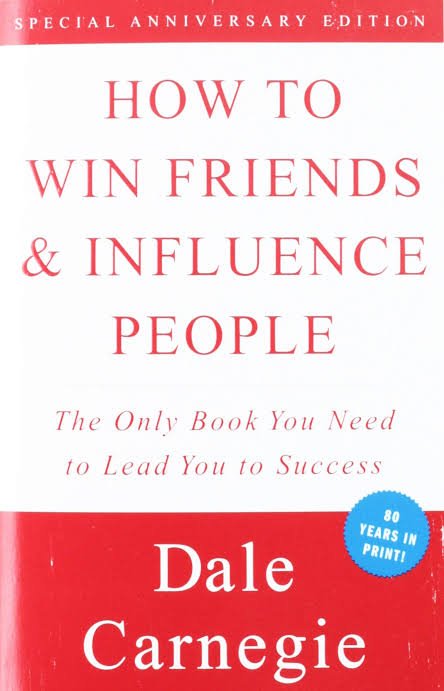First published in 1937, How to Win Friends and Influence People is a book by the American best-selling author, Dale Carnegie. Translated into several languages, this book has sold over 30 million copies making it one of the bestselling books of all-time. Evidently, it is no exaggeration to say that it is one of the best books ever written on the art of dealing with and getting along with people.
Recently, my good friend and founder of @project.hope, @Crypto.piotr, recommended the book to selected members of the aforementioned project and went on to incentivize us to read the book and possibly do a short review of some of the lessons learnt from reading the masterpiece. It was his intention to train us in the art of dealing with people.
?he book, I've read it twice. Nevertheless, it was refreshing going over the timeless lessons of the book again. Since I run the risk of writing a textbook by attempting to review a book that is over 300 pages, I will be focusing on an essential lesson, the first lesson in short, contained in the introductory part of the book. And the lesson is simple -- it is futile to criticize people. Avoid it.

In driving home his points, Dale Carnegie reminds us that it is an exercise in futility to attempt to change people by criticizing them. He tells us to avoid every urge to do so because it creates resentments instead of repentance. It is in human nature, Carnegie emphasizes, to put up defences when at fault and to never accept blames. He then says that the best way to deal with people is to avoid criticizing them because, although it makes the critic feel good, the victim becomes defensive and bitter.
To illustrate this fine point, Carnegie tells the story of notorious American criminals such as Al Capone, Two Guns Crowley, and Dutch Schultz, who never admitted to be wrong even with the staggering atrocities that they've committed. Upon their arrest, each of these deadly men, Carnegie narrates, believed that they were being treated unfairly by the criminal justice system. To these men, they were being persecuted. Now, if notorious criminals would not accept that they were wrong for engaging in criminality, will normal people take blames?
To further drive home his points, Carnegie narrates the story of how Abraham Lincoln, as a young man, was given to sharply criticizing the actions of others by sending anonymous letters and making caricature of people with whom he disagreed. Lincoln however ran into serious trouble when he anonymously published a virulent attack on a pugnacious politician named James Shields. Having unmasked the hand behind the letter, the latter became so furious that he challenged Lincoln to a duel. Both men met on a sandbar on the edge of the Mississippi River, almost fighting to death, before some friends ended the duel.
Abraham Lincoln had learnt his lessons, it was fruitless to criticize people. He would spend the rest of his life avoiding to criticize people even when they were obviously wrong. A good example was Lincoln's refusal to criticize General Meade for disobeying his orders to attack the trapped Confederate Forces during the battle of Gettysburg in 1863. Had Meade struck the vulnerable and weary Confederate Forces, victory would have been guaranteed and the civil war would have ended. But Meade refused to strike, thereby prolonging the war. But President Abraham Lincoln kept his calm. He had learnt a vital lesson -- it was futile to criticize people.
By taking us through the life of Abraham Lincoln and the works of prominent psychologist such as B.F Skinner, Carnegie is able to persuade us to avoid criticizing people as best as we can because, in most cases, it is an exercise in futility. Just like the lantern is unable to illuminate its own base, man is unable, at least in most cases, to take blames and accept criticism. So why criticize others?
Warning! This user is on our black list, likely as a known plagiarist, spammer or ID thief. Please be cautious with this post!
If you believe this is an error, please chat with us in the #appeals channel in our discord.
I read this book some time ago and did a review on it .. the book has so much wisdom. I mean nobody wants to be criticized ...
Abraham Lincoln was a president like no other
It's good to know that you've also read this book. I first read it over a decade ago as a freshman at the university. It's really a great book.
Congratulations @gandhibaba! You have completed the following achievement on the Hive blockchain and have been rewarded with new badge(s) :
You can view your badges on your board And compare to others on the Ranking
If you no longer want to receive notifications, reply to this comment with the word
STOPTo support your work, I also upvoted your post!
Do not miss the last post from @hivebuzz:
I would add:
Now some might take this as a peer pressure thing, but I would say that with grace, we can present challenging criticism. Like an art-form in communication.
That's correct. The manner it is done is what matters.
is an interesting book that has taught me how to "positively criticize" other people's achievements and ideas, a great book that educates us on how to be better people.
you just won my heart by elaborating the book in such a beautiful manner friend. I also read that book and litterly it guides mankind to how to behave in a positive way and and transform our ability
I read this long ago...nice read